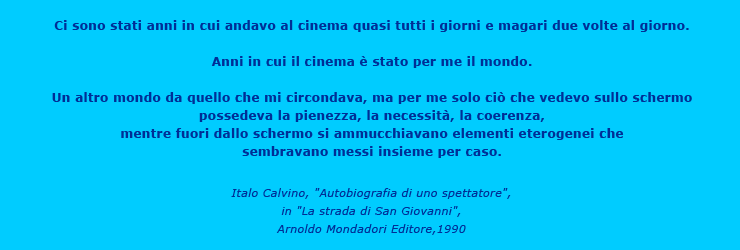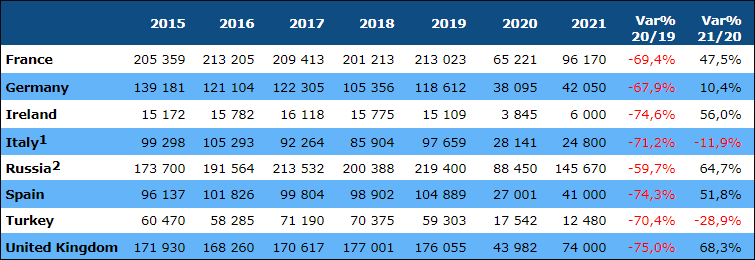
Reg. Trib. Milano n. 418 del 02.07.2007
- Direttore responsabile: Elisabetta Brunella
 |
 |
International Edition No. 193 - year 17 - 9 February 2022
Special issue on the occasion of the 72nd Berlin International Film
Festival

more than 15,000 subscribers |
On the occasion of the Berlinale,
MEDIA Salles presents the new statistics on cinema-going
|
||
Theatrical admissions on the leading European markets
1) Cinetel data
A two-speed Europe As we write there are no final figures yet but, on the basis of provisional figures or estimates, there are plenty of different readings oscillating somewhere between concern and optimism. Will 2022 really be the year we return to the movie theatre? Or will it confirm the hypotheses of those who foresee that the new forms of consumption of audiovisual products that boomed during lockdown will prevail? But let’s take a look at the figures. But the start of 2020 had been particularly brilliant for Italian cinemas. A positive sign, bringing hope for 2022, came in 2021 from the pre-Christmas period, immediately before the adoption of more severe measures for accessing theatres: admissions were only about 10% lower than the same period in 2019, when Covid was as yet unknown. Before looking at the other leading European markets, let us take a glance at a country which, like Italy, closes with a minus sign, but records a greater percentage drop in spectators. This country is Turkey, a market where screens have increased fourfold and spectators threefold over the past 20 years. In 2021 the figures available up to now indicate a drop of nearly 30% to join the decrease of around 70% experienced in 2020. News of a more optimistic nature comes from Germany. Here, according to the figures just published by the FFA for the Berlinale, ticket sales in 2021 have totalled 42.1 million. The increase compared to 2020 is 10.4%. Still more encouraging are the figures provided by the CNC for France which, benefitting from an approximate 47% rise, totals 96 million spectators, adding over 30 million more than in 2020. A higher percentage increase is recorded in Spain which grows by almost 52%, to reach 41 million spectators, i.e. about 14 million more, compared to 2020. With a leap forward of 65% Russia confirms its position as Europe’s leading market in terms of admissions, which come to over 145 million in 2021. And what did audiences go and watch in 2021? What has made the difference has been the impact of domestic films. In the ultimate top ten in Italy comes "Me contro Te" (6.8% of gbo in the top ten), in Spain "A todo tren. Destino Asturias" (9.8%). In France there are three champions ("Kaamelott-premier volet", "Les Tuche 4" and "BAC Nord" totalling 26.0%), in Germany two ("Schule der magischen Tiere" and "Kaiserschmarrndrama": 10.4%) and two in Russia (both episodes of the fantasy saga "The Last Bogatyr": 24%). For domestic films more or less everywhere in Europe it has naturally been a very different year from the one preceding it. At that time, in the first year of Covid and lockdown, they were the pillars of cinema on the big screen, with exceptionally high percentages of admissions, which touched on or even amply exceeded 50% on many markets, such as Russia, the Czech Republic, Denmark, Poland and Italy. Not to speak of the 80% peak in Turkey. This is an updated version of the article published in the Berlinale special issue of Cinema & Video Int'l, the MEDIA Salles media partner.
|
To quickly get to the previous issues, click on these buttons!
 |
MEDIA Salles Piazza Luigi di Savoia, 24 - 20124 Milano - Italy Tel.: +39.02.6739781 - Fax: +39.02.67397860 E-mail: infocinema@mediasalles.it |
|




